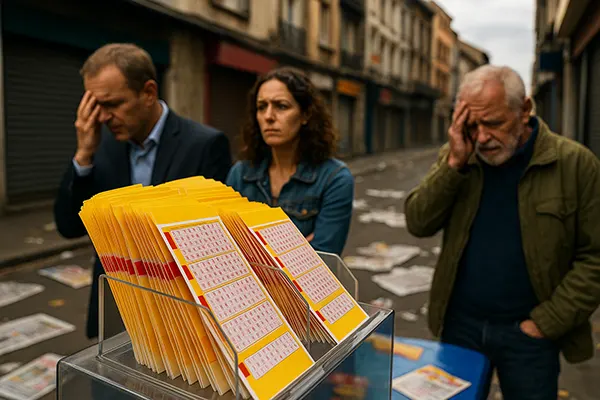
Lottery Fever in a Crisis: Why Ticket Sales Surge During Inflation (Case Study of the US, Spain, and Ukraine)
When economic stability falters and inflation bites into household budgets, people often seek unconventional means to improve their financial situation. One such phenomenon that becomes particularly visible during times of economic stress is the rise in lottery ticket sales. From the United States to Spain and Ukraine, there’s a clear pattern: the more uncertain the economy, the more attractive the promise of a sudden windfall becomes.
Economic Crisis and Lottery Spending: Statistical Reality
During periods of inflation and recession, lottery sales often increase significantly. For instance, in the US during the 2008–2009 recession, ticket sales rose by approximately 9%, according to the North American Association of State and Provincial Lotteries. In Spain, despite years of austerity, the traditional Christmas lottery (El Gordo) consistently saw high participation — over 70% of Spaniards bought at least one ticket during the 2012 economic slump.
Ukraine shows similar trends. In 2022–2023, amid high inflation and economic pressure from war, online lottery purchases surged by over 30%, as reported by domestic operators. This shift was not only due to limited physical outlets but also reflected a growing belief in lotteries as one of the few accessible hopes for change.
Data points to a paradox: even when disposable income is low, people allocate funds to lotteries, highlighting a deep psychological and social reaction to economic instability.
Why Recessions Trigger Lottery Behaviour
The psychology behind lottery spikes in crises is rooted in loss aversion and desperation. When people feel their future is slipping out of control, gambling — especially in a socially accepted format like national lotteries — can seem like a rational decision, not a frivolous expense.
During inflation, everyday goods become more expensive, savings erode, and job security diminishes. A lottery ticket, even for a modest sum, represents hope. The odds may be low, but the payoff could solve everything overnight. This perceived escape from hardship often overrides rational thinking.
Moreover, lotteries are positioned as low-barrier entry points to potential wealth, unlike investment or entrepreneurship which require time, knowledge, and capital. In tough times, the speed and simplicity of a ticket become compelling.
Behavioural Contrast: Stable Times vs. Crises
In economically stable periods, lottery ticket sales tend to plateau or decline slightly. This was evident in the US post-2015, where growth in lottery revenue slowed. The logic is straightforward: when people feel secure, the appeal of risk-taking diminishes. Financial decisions are more cautious and oriented toward long-term planning.
In Spain, after a relative recovery in 2015–2019, participation in smaller draws dropped slightly as consumers prioritised savings and investments. Similarly, in Ukraine during pre-crisis years (2017–2019), demand for lottery products was more subdued, with players treating them more as entertainment than a potential lifeline.
This contrast underscores that lottery engagement is less about entertainment and more about economic sentiment. It becomes a barometer of social anxiety, rising in direct proportion to perceived instability.
Media Narratives and Social Influence
During downturns, lottery jackpots often receive heightened media coverage. Reports on record winnings or emotional winner stories gain traction and reinforce the idea that ‘someone has to win’ — creating a social narrative that normalises participation.
In Spain, El Gordo coverage includes TV shows, interviews with winners, and dramatic presentations of the draw. This tradition embeds the lottery into national identity and softens its association with economic struggle, framing it as part of cultural resilience.
In Ukraine, social media plays a crucial role. Stories of winners gaining large sums with minimal investment go viral, generating engagement and fuelling participation, especially among younger adults seeking quick financial solutions.

Socioeconomic Implications: Beyond the Numbers
While the increase in ticket sales may appear as a symptom of collective hope, it also raises important ethical and economic questions. Lotteries disproportionately attract lower-income individuals who can least afford consistent losses. During inflation, their vulnerability increases, making the psychological cost of hope higher.
For governments, lottery revenues are an important source of funding, often directed at social causes like education or healthcare. Yet, this creates a contradiction: essential services are funded by a mechanism that thrives in economic hardship and preys on financial anxiety.
In the long term, relying on lotteries as a fallback financial strategy reflects a deeper systemic issue. It signals eroded trust in institutions and the belief that hard work no longer guarantees stability. Understanding this dynamic is crucial for policymakers, economists, and social researchers alike.
Conclusion: A Gamble Rooted in Desperation
Lottery fever during inflation is not merely a curiosity — it’s a revealing mirror of societal unease. In the US, Spain, and Ukraine, this trend underscores how economic uncertainty reshapes consumer behaviour, turning chance into a perceived necessity.
While millions continue to hope for a life-changing ticket, the broader message is clear: people are seeking agency in systems that feel rigged against them. Until structural economic reforms address inequality and insecurity, lottery spending will likely remain a quiet but persistent indicator of public despair.
Understanding this helps reframe lotteries not as games, but as economic artefacts — ones that emerge most vividly when people feel they have no better options.
